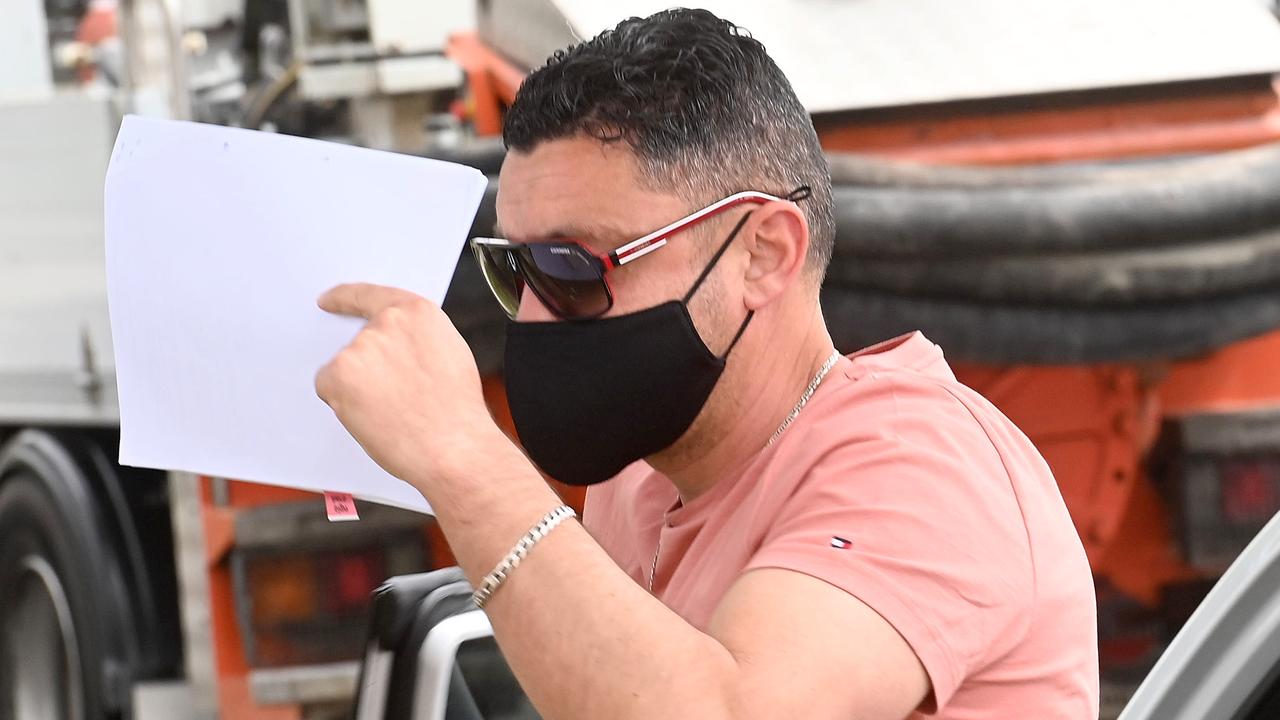Jack de Belin and Callan Sinclair await their fate on sexual assault charges
The jury in the Jack de Belin sex assault trial will resume their deliberations on Monday where they will decide the fate of the NRL superstar. Here is the breakdown of both sides of the case.
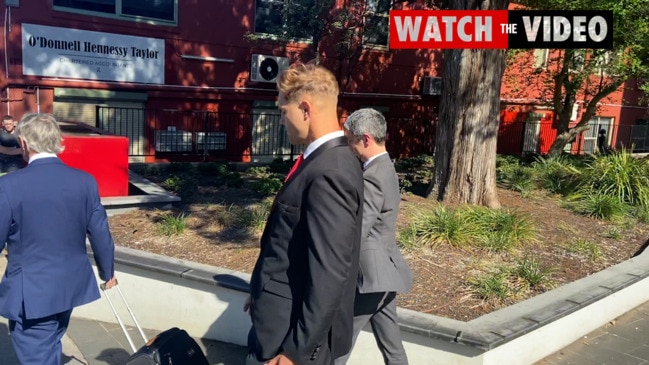
Police & Courts
Don't miss out on the headlines from Police & Courts. Followed categories will be added to My News.
A jury of five women and six men will continue to pore over evidence this week as they ponder the fate of NRL superstar Jack de Belin.
The jury in the high-profile District Court sex assault trial was sent home on Thursday afternoon and did not sit on Friday.
They will return on Monday morning to discuss evidence put to them by the prosecution and defence during the three-week trial.
De Belin, 29, and his friend Callan Sinclair, 23, have pleaded not guilty to sexually assaulting a 19-year-old woman after a Wollongong pub crawl in 2018.
The pair maintain group sex with the woman was consensual.
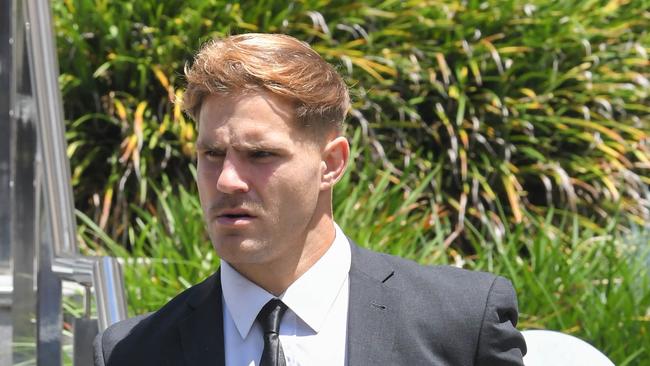
Judge Andrew Haesler told the court last week there was “no reason or rhyme” to determine how long it would take for a verdict to return.
A jury took five days in September to find two men not guilty of murdering notorious bikie Mick Hawi.
Another jury needed only three hours to decide Sydney removalist Tareq Mikhael Setto was guilty of raping a nurse after a one-week trial in June.
De Belin’s barrister David Campbell told The Daily Telegraph: “As you would expect, everyone concerned is sweating on the outcome … of course any delay involves stress.”
In his detailed closing statements, Judge Haesler told the jury they would have to be convinced “beyond reasonable doubt” the men had done the crime – if they were to return with a guilty verdict.
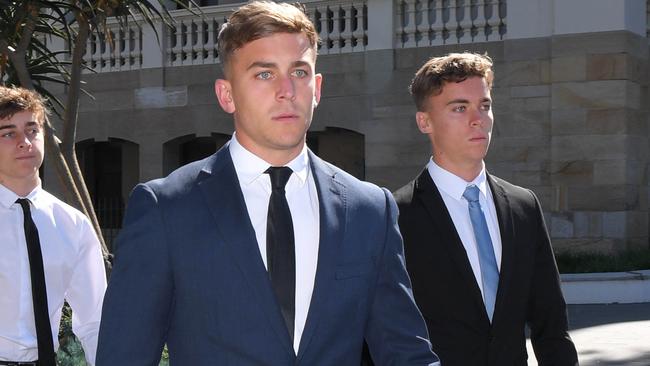
“There is a clear conflict between the evidence of the complainant and the evidence of the two accused,” Judge Haesler told the court on Thursday.
“When you consider your verdicts, you cannot help but ask the question: “Well, who’s to be believed?
“It’s essential, however, that even if you reject an accused’s version, that does not conclude the issues you have to determine.
“That issue remains … have the prosecution proved guilt beyond reasonable doubt?”
Judge Haesler asked the jury to use both arguments as “guides” to determine their decisions.
“Please consider their arguments. Use them as guides to your discussion with the jury. Whether you accept the arguments of Council is a matter for you. In this trial, you are sole judges of the facts,” he told the court.
ARGUMENTS BROKEN DOWN
Prosecution: Crown Prosecutor David Scully SC
Defence: De Belin’s barrister Andrew Campbell SC and Sinclair’s barrister Craig Smith SC
The complainant’s credibility
Prosecution:
The prosecution told the jury the woman was a “compelling” witness and that she did not consent to sex with the pair and made it clear.
They said both accused knew she was not consenting.
De Belin and Sinclair had planned a threesome but did not bother to tell the woman, the jury was told.
Just because she was dancing and flirting with the men and kissed Sinclair did not mean she consented to sex later on, the prosecution told the jury.
They also said that what the woman said after the event to others was “entirely consistent and entirely believable”.
The prosecution told the jury that when you consider the narrative of events in its entirety the woman’s version should be acceptable beyond reasonable doubt.
Defence:
The defence told the jury the woman was unreliable and inconsistent in her statements and that she consented to sex with the pair and made it clear.
Both accused knew she was consenting, the defence told the jury.
They said that De Belin had asked the woman at a nightclub, “You, me and Cal?”, and she smiled and winked.
The defence told the jury the woman knew they were going back to the apartment for a threesome and went with them willingly and that the woman was “inconsistent” and told differing statements to different people, so her version of events was unreliable and should not be believed.
When you consider the narrative of events in its entirety it will be clear the pair are not guilty, the defence said.
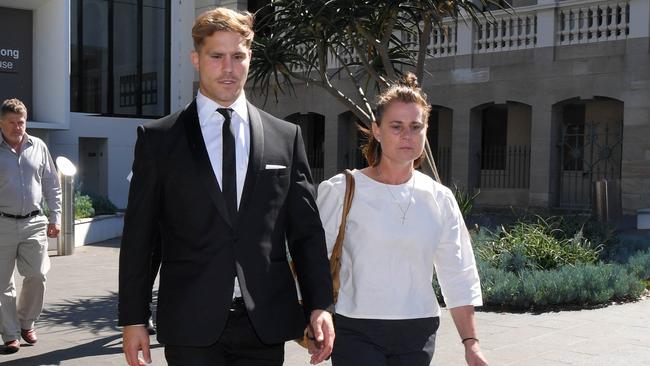
Before the unit
Prosecution:
The prosecution told the jury the mood changed after the tuktuk turned right into Keira St, when the woman realised they were not going to Fever nightclub.
Defence:
The defence told the jury it was a “happy” event in the tuktuk.
Messages between the woman and her friend Andrew Kyriacou, which read: “When you wanna get high”, were sent around this time. She wanted to get high after having consensual sex, the defence said.
What happened in the unit
Prosecution:
The prosecution told the jury that De Belin took off the woman’s red top and that De Belin never left the room.
There was no oral sex, the prosecution told the jury and that the woman said “no” “stop” but they continued to have sex with her.
The prosecution said the woman said they were “cheering each other on”.
Sinclair went and got moisturiser from the bathroom and tried to have anal sex with the woman, but it did not work, the prosecution told the jury and that De Belin tried to have anal sex with the woman, but it was sore so he stopped and he apologised.
The woman did not say anything about De Belin having a girlfriend, the prosecution told the jury.
Defence:
The defence told the jury the woman took off her own top and that De Belin left the room to speak to house occupant Troy Martin, who woke up when they arrived at the unit.
De Belin came back in and performed oral sex on the woman, the defence said.
She was “moaning” and saying “yes” during sex and the men said they were not cheering each other on, the defence told the jury.
They said Sinclair did not get moisturiser to try and have anal sex with the woman and that De Belin accidentally put his penis in the woman’s bottom and apologised.
The defence told the jury the woman became upset briefly after sex and said something like: “But Jack has a girlfriend”.
He said something like: “Don’t worry babe, we’re on the rocks” and she was fine after that, according to the defence.
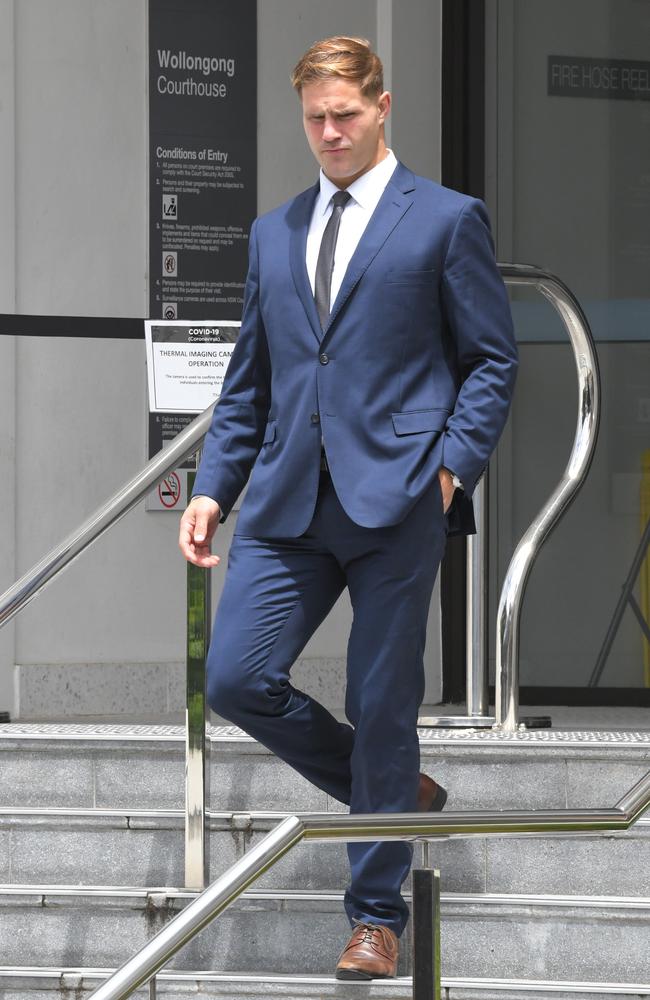
After the unit
Prosecution:
The prosecution told the jury the woman caught an Uber with the men to Fever nightclub and “got away” when they started talking with friends in the line.
De Belin had given her $50 for the Uber and told her “to keep (her) mouth shut” and then she started texting her friends asking for help soon after leaving the line then cried herself to sleep, the prosecution said.
Defence:
The defence told the jury that De Belin gave the woman cash for the ride but it was before they got in the Uber and he never said it was also to “keep her mouth shut”.
De Belin said he was talking and joking with the woman while waiting for the ride, the defence said.
She texted her friend Andrew Kyriacou again to ask where he lived, in order to get high and that is why she left the Fever line, the defence told the jury.
But Mr Kyriacou did not get back to her quick enough so she went home, according the defence.
The pair did not treat the woman as respectfully as they could, but “consent later regretted was still consent”, the defence said.
Accused
Prosecution:
The prosecution told the jury that De Belin “weaved false versions” of events into his statements and that Sinclair lied so his statement would match de Belin’s when he told the court he “made a mistake” about when he first saw the woman.
The prosecution said that in phone taps played to the court, Sinclair told family he saw the woman at the North Gong Hotel first where she was “hanging around like a bad smell”, then at Mr Crown.
The prosecution told the jury that De Belin told the court he first saw the woman when she hugged him at Mr Crown.
The prosecution did not challenge the pair’s good character.
Defence:
The defence told the jury that De Belin and Sinclair were “consistent, reliable” in statements and that Sinclair “made a mistake” when he told family he saw the woman at North Gong first.
The defence said De Belin received good character statements from his sister and the Dragons’ former CEO and that Sinclair received good character statements from his aunt, friends and housemates.
The defence told the jury that both men voluntarily gave DNA samples to police and allowed photographs to be taken and that both men gave evidence in court when they did not have to.


